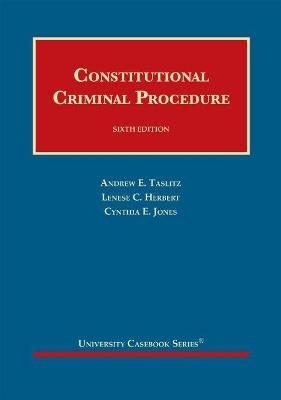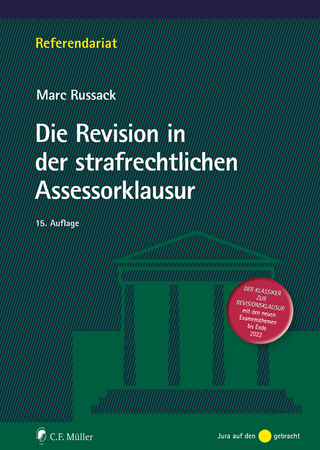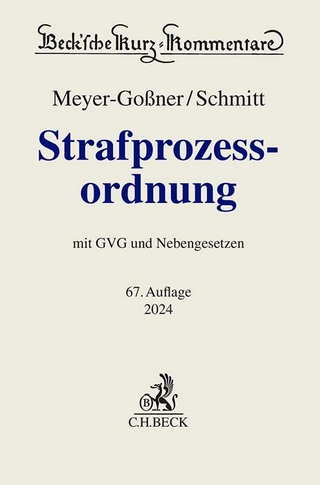
Constitutional Criminal Procedure
Seiten
2021
|
6th Revised edition
West Academic Press (Verlag)
978-1-64242-109-5 (ISBN)
West Academic Press (Verlag)
978-1-64242-109-5 (ISBN)
- Titel z.Zt. nicht lieferbar
- Versandkostenfrei innerhalb Deutschlands
- Auch auf Rechnung
- Verfügbarkeit in der Filiale vor Ort prüfen
- Artikel merken
The January 2021 Capitol Hill riots, the summer 2020 Black Lives Matter protests, the killings of George Floyd and Breonna Taylor, and increasingly pervasive use of technology in criminal investigations are the contemporary national issues that are captured in the sixth edition of Constitutional Criminal Procedure.
The January 2021 Capitol Hill riots, the summer 2020 Black Lives Matter protests, the killings of George Floyd and Breonna Taylor, the wave of state and local reforms to policing powers, and increasingly pervasive use of technology in criminal investigations are the contemporary national issues that are captured in the Sixth Edition of Constitutional Criminal Procedure.
The Sixth Edition offers maximum pedagogical freedom to craft an exciting course using seminal U.S. Supreme Court cases, sample court documents, illuminating graphics, and problem-solving opportunities throughout a text that maintains its relevance and user-friendly structure for new and old adopters alike. It excerpts cutting-edge law review articles, emergent social science research, and interdisciplinary essays, as well as infusing insights from respected legal experts and other significant 21st century voices.
The Sixth Edition also presents an exciting new co-author collaboration between former federal prosecutor, Professor Lenese C. Herbert of Howard University School of Law, and Professor Cynthia E. Jones of the American University Washington College of Law, who worked as a trial attorney at the Public Defender Service for the District of Columbia and later became the agency director. Both experienced law professors, Professors Herbert and Jones have made effective use of their “across-the-aisle” collaboration in the Sixth Edition of Constitutional Criminal Procedure.
The Sixth Edition infuses more contemporary materials in a more accessible format for a broader range of adopters and students. It includes:
Original charts, tables, and graphs that summarize certain complex constitutional principles (that also benefit visual learners, currently estimated at 65% of the population);
A NEW chapter that contextualizes race and policing, as well as the high-profile cases that led to the 2020 Black Lives Matter protests and the myriad of criminal justice reforms that have resulted (e.g., "Breonna’s Law" which eliminates no-knock warrants; "Defund/Reform the Police" efforts; newly promulgated "use of deadly force" restrictions);
Use of warrant affidavits filed in connection with the January 2021 Capitol Hill riots to illustrate probable cause, and the effective use of technology in law enforcement;
A NEW chapter dedicated to motions to suppress and pretrial suppression hearings which includes trial documents and pleadings, specifically: the defense motion to dismiss, the government's opposition, and the court's published opinion (tools that support both doctrinal and clinical adopters who seek "real world," tactical learning tools);
SHORTER, more "teachable" chapters (edited with an eye toward syllabi/class hour needs and designed to enhance learning, given the sustained and shifting attention span concerns of 21st teaching);
An EXPANDED Surveillance Chapter re: criminal procedure and the law of emerging technologies (e.g., geofencing, facial recognition technology, the Internet of Things);
UPDATED problems;
and Federal circuit court citations of note (which illustrate relevant examples of innovative lawyering, creative adjudication, application of precedent, and "circuit split").
The January 2021 Capitol Hill riots, the summer 2020 Black Lives Matter protests, the killings of George Floyd and Breonna Taylor, the wave of state and local reforms to policing powers, and increasingly pervasive use of technology in criminal investigations are the contemporary national issues that are captured in the Sixth Edition of Constitutional Criminal Procedure.
The Sixth Edition offers maximum pedagogical freedom to craft an exciting course using seminal U.S. Supreme Court cases, sample court documents, illuminating graphics, and problem-solving opportunities throughout a text that maintains its relevance and user-friendly structure for new and old adopters alike. It excerpts cutting-edge law review articles, emergent social science research, and interdisciplinary essays, as well as infusing insights from respected legal experts and other significant 21st century voices.
The Sixth Edition also presents an exciting new co-author collaboration between former federal prosecutor, Professor Lenese C. Herbert of Howard University School of Law, and Professor Cynthia E. Jones of the American University Washington College of Law, who worked as a trial attorney at the Public Defender Service for the District of Columbia and later became the agency director. Both experienced law professors, Professors Herbert and Jones have made effective use of their “across-the-aisle” collaboration in the Sixth Edition of Constitutional Criminal Procedure.
The Sixth Edition infuses more contemporary materials in a more accessible format for a broader range of adopters and students. It includes:
Original charts, tables, and graphs that summarize certain complex constitutional principles (that also benefit visual learners, currently estimated at 65% of the population);
A NEW chapter that contextualizes race and policing, as well as the high-profile cases that led to the 2020 Black Lives Matter protests and the myriad of criminal justice reforms that have resulted (e.g., "Breonna’s Law" which eliminates no-knock warrants; "Defund/Reform the Police" efforts; newly promulgated "use of deadly force" restrictions);
Use of warrant affidavits filed in connection with the January 2021 Capitol Hill riots to illustrate probable cause, and the effective use of technology in law enforcement;
A NEW chapter dedicated to motions to suppress and pretrial suppression hearings which includes trial documents and pleadings, specifically: the defense motion to dismiss, the government's opposition, and the court's published opinion (tools that support both doctrinal and clinical adopters who seek "real world," tactical learning tools);
SHORTER, more "teachable" chapters (edited with an eye toward syllabi/class hour needs and designed to enhance learning, given the sustained and shifting attention span concerns of 21st teaching);
An EXPANDED Surveillance Chapter re: criminal procedure and the law of emerging technologies (e.g., geofencing, facial recognition technology, the Internet of Things);
UPDATED problems;
and Federal circuit court citations of note (which illustrate relevant examples of innovative lawyering, creative adjudication, application of precedent, and "circuit split").
| Erscheinungsdatum | 01.10.2021 |
|---|---|
| Reihe/Serie | University Casebook Series |
| Verlagsort | Minnesota |
| Sprache | englisch |
| Maße | 191 x 254 mm |
| Gewicht | 1638 g |
| Themenwelt | Recht / Steuern ► EU / Internationales Recht |
| Recht / Steuern ► Strafrecht ► Strafverfahrensrecht | |
| ISBN-10 | 1-64242-109-X / 164242109X |
| ISBN-13 | 978-1-64242-109-5 / 9781642421095 |
| Zustand | Neuware |
| Haben Sie eine Frage zum Produkt? |
Mehr entdecken
aus dem Bereich
aus dem Bereich
Buch | Softcover (2023)
C.F. Müller (Verlag)
24,00 €
Gerichtsverfassungsgesetz, Nebengesetze und ergänzende Bestimmungen
Buch | Hardcover (2024)
C.H.Beck (Verlag)
115,00 €
mit Auszügen aus Gerichtsverfassungsgesetz, EGGVG, …
Buch | Softcover (2024)
dtv Verlagsgesellschaft
12,90 €


